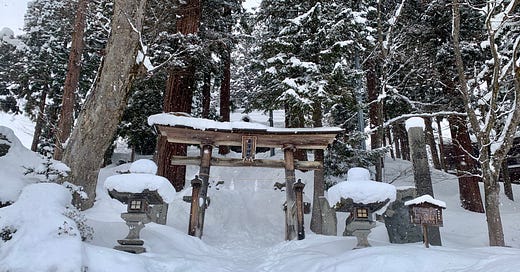The Heart of Shinto
Objects, the living and created things around us that we use and experience in our daily lives, have inherent spirituality. You could say that they have souls.
A cup has a soul. A shirt has it. A rope, a mountain, a tree, a thunderstorm have it. They have desires, they feel that they are made for a purpose, receive joy from being put to good use, and they want to die having lived a fulfilled and useful life, just as we do.
When a barn that served a family farm for a hundred years finally falls down and you pry nails from its remains, that was a happy barn and those were very fulfilled and happy nails.
My mother is Japanese. What I just described is the essence of Shinto, which having no central authority, sacred text or doctrines about exclusivity, isn’t a quite a religion by most Western ideas, but rather an ancient practice and considered the founding spirituality of Japan.
Non-exclusive means that Shinto, like Buddhism, doesn't preclude following other religions. There are Catholic bishops who practice Buddhism, and say that Buddhism makes them better Catholics.
If you have given a name to your car, or a personality to a stuffed animal, you may have a compatible practice. If you enjoy visiting antique shops and thrifting, perhaps you understand how giving new purpose to an object that believed it had outlived its useful life, allows it to experience resurrection.
There's an old Japanese folk tale about an old woman who carried water daily in two buckets from the river. One of the buckets was leaky, and every trip returned from the well only half full. The leaky bucket apologized to the old woman, saying, I wish I could carry water as well as the other buckets. The old woman said, look behind you, and pointed to the the path to the well, to the lush grass and flowers growing beside the path that the leaky bucket had been watering all along.
What kind of bucket are you?
What if you could get together with a few hundred other buckets and make art?
What if?

What would it mean if you really internalized this in practice? Would it change what you wear, when you throw away, how you travel, how you play?
If a cup can *want* to be well-constructed and healthy despite its age, if a guitar can want to be used beautifully and live out its days serving a purpose, if a car or a boat can want to go on adventures or critical missions - does it change whether we buy the cup? How we use the car?






